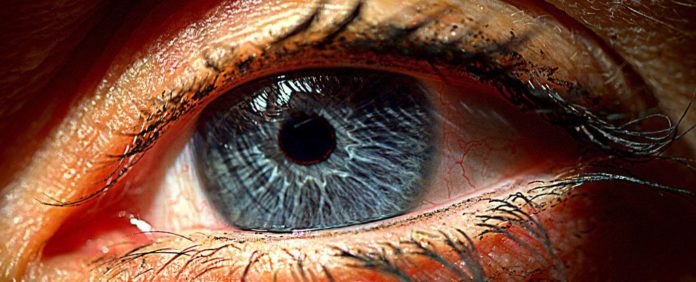
In an extraordinary feat, researchers at the Italian Institute of Technology (IIT) have developed an artificial retinal implant that could reverse vision loss in rats. Since the new technology gives hope to millions who lose their vision due to degenerative diseases of photoreceptors including Retinitis Pigmentosa, researchers plan to carry out the first human trials in the second half of 2017, and gather preliminary results during 2018.
Created from a thin layer of conductive polymer, the retinal implant converts light into an electrical signal to stimulate retinal neurons. Science Alert explains:
“The implant is made from a thin layer of conductive polymer, placed on a silk-based substrate and covered with a semiconducting polymer. The semiconducting polymer acts as a photovoltaic material, absorbing photons when light enters the lens of the eye. When this happens, electricity stimulates retinal neurons; filling in the gap left by the eye’s natural but damaged photoreceptors.”
Made up of several million light-sensitive photoreceptor cells, the retina is a layer of tissue in the back of the human eye that senses light and sends images to the brain. Mutations in any of the 240 identified genes cause retinal degeneration, progressive disintegration of photoreceptors, vision impairment and eventual blindness.
Even as degeneration of photoreceptors in the retina is one of the major causes of blindness in humans, there is no effective clinical treatment to replace a damaged retina or cure the majority of retinal degenerative disorders.
In previous research, scientists attempted to reverse vision loss with specially-designed bionic eye devices that convert light into an electrical signal to stimulate retinal neurons. Scientists have also attempted to reverse vision loss by repairing genetic mutations using the CRISPR gene editing technology.
For the first time, the implant developed by Italian researchers paves the way for developing a new generation of fully organic, highly biocompatible and functionally autonomous photovoltaic prosthesis for sub-retinal implants to treat degenerative blindness. There is hope because, fortunately, the retinal neurons surrounding the affected cells remain perfectly intact and functional in patients suffering from retinal degenerative disorders.
Guglielmo Lanzani, director of Centre for Nanoscience and Technology at the Italian Institute of Technology, remarked:
“The use of this semiconductor organic material was crucial to address a number of issues. Being organic, this material is soft, light and flexible, provides an excellent biocompatibility also avoiding complications to surrounding tissues, thus ensuring long-term functioning.
“Moreover, organic polymers can transmit electronic and ionic impulses without dispersing too much heat, which could cause additional damage to a retina which is already experiencing a degenerative process.”
To test the new technology, the researchers implanted the first ever retina built with carbon polymers into the eyes of a few blind rats. Based on the results, they concluded the artificial retina could directly activate residual neuronal circuitries in the degenerate retina.
The artificial retina could also restore the pupillary reflex, electrical and metabolic responses to light stimuli in the cortex, the capacity of spatial discrimination (visual acuity) and light sensitivity for over 10 months after surgery — without causing any inflammation to retina tissues and without causing any degradation of prosthesis materials.
Fabio Benfenati, director of Center for Synaptic Neuroscience and Technology at the Italian Institute of Technology, commented:
“This approach is an important alternative to the methods we have used so far to restore neuron photoreceptive capacity. As compared to the two models of artificial retina currently available which are based on silicon technology, our prototype has a number of advantages including marked tolerability, long duration and full autonomy of functioning, with no need for an external power source.
“These ‘structural’ advantages are accompanied by restored visual function and not only in terms of light sensitivity, but also in terms of visual acuity and metabolic activity of visual cortex.”
A new artificial retina is being tested in pigs as their eyes are similar to humans in terms of size and microscopic structure. Grazia Pertile, an ophthalmologist at Italy’s Sacred Heart Don Calabria and a member of the research team, noted:
“We hope to replicate in humans the excellent results obtained in animal models. We plan to carry out the first human trials in the second half of this year and gather preliminary results during 2018. This [implant] could be a turning point in the treatment of extremely debilitating retinal diseases.”
This article (Scientists Create Fully Organic Retina Implant that Could Restore Vision to Millions) is a free and open source. You have permission to republish this article under a Creative Commons license with attribution to the author and AnonHQ.com.
Supporting Anonymous’ Independent & Investigative News is important to us. Please, follow us on Twitter: Follow @AnonymousNewsHQ





Hey Vandita,
I just wanted to reach out and say “thanks” for adding back link for the article [Scientists Have Created an Artificial Retinal Implant That Could Restore Vision to Millions] in your excellent article.
We really, really appreciate it.
I’m reaching out today to ask if you could update a link back to our new site. That way, people can easily find us while reading your article.
Old Domain: snaxzer.com
New Domain: techexplorist.com
Updated URL: https://www.techexplorist.com/scientists-created-artificial-retinal-implant-restore-vision-millions/
Either way, thanks for the shout out and keep up the great work!
Thanks,
Amit
done
Thank you 🙂